
How To Dry Chilies And Sweet Peppers
Whether you use them whole, as a ground spice, or to make your own spicy chili flakes, dried sweet peppers and chilies make an excellent addition to any spice cabinet or pantry. Best of all, drying them is surprisingly simple!
If you took advantage of the summer heat to grow your own chilies, drying them is the best way to preserve the fruits of your labour. When done correctly, dried or dehydrated chilies and peppers retain their flavours and heat. And while it's far from rocket science, a few simple tips can help you dry and preserve them for longer.
Read on for simple instructions to dry a wide variety of chilies right at home.
How to dry chilies and peppers
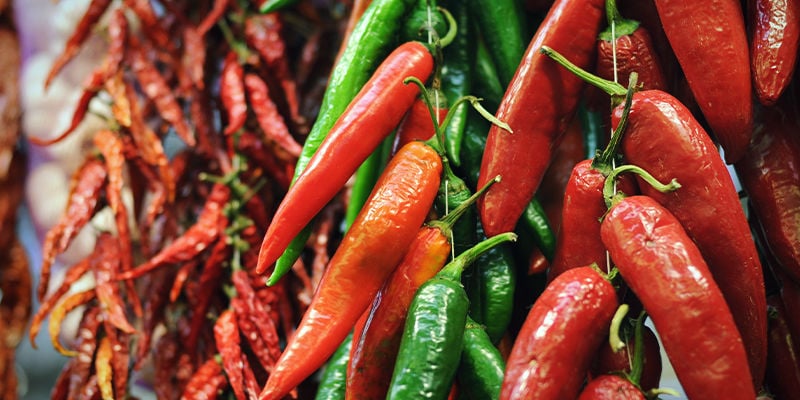
Most vegetable gardeners love to grow chilies, and for a good reason. Not only do they taste delicious, but chilies and peppers are packed with nutrients, vitamins, and minerals. Growing chilies is also relatively simple compared to other crops, and most capsicum cultivars deliver excellent yields (one or two plants usually offer more than enough fruit for one household can deal with before they go bad (hence dry some!).
If you've grown your own chilies over the summer or stocked up from a local supermarket, drying is the best way to preserve their flavours, nutrients, and spice. Below you'll find all the information you need to dry your chilies and peppers on a rack, in the oven, using a dehydrator, or by simply hanging them on a piece of string. These tips work for all chilies and peppers, including bell peppers and your favourite hot chilies, too!
Precautions Before Drying Chilies
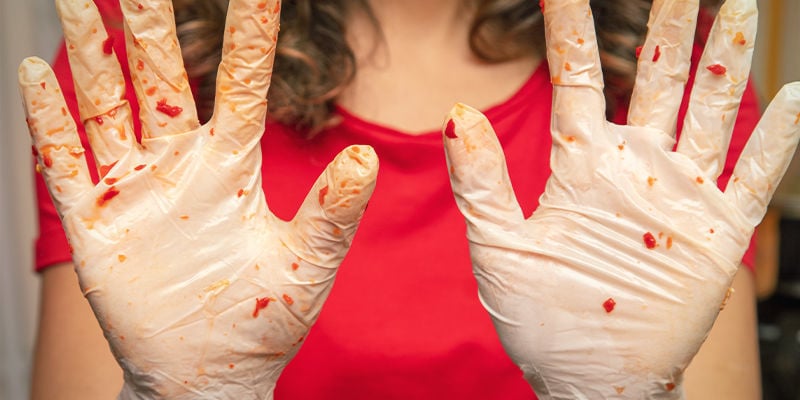
Before you jump into drying your chilies, there are a couple of things you need to consider. These include:
Protecting yourself and your environment
Protecting your eyes and skin is very important when handling hot chilies. Chilies contain capsaicin, an oil-like compound that will leak onto our hands and fingers when we handle them, and can irritate the skin, mouth, or eyes. Hence, we recommend using protective goggles and gloves whenever handling hot chilies to avoid any accidents.
If you're drying sweet peppers, goggles and gloves aren't necessary. Just remember to wash and dry your hands thoroughly before getting started.
Selecting the best berries
When drying chilies, selecting the right berry for drying is super important. Berries that aren't fresh, have been bruised or started to rot won't dry well and can create a breeding ground for bacteria and fungi.
Before you start the drying process, make sure to discard any fruits that are:
- Soft, mushy, or rotten
- Have a bad odour
- Look overripe or not fully mature
- Have greyish discolourations or bruised flesh
Remember that you don't have to let these chilies go to waste. Older chilies, for example, can be roasted over the fire and preserved in oil for a couple of days. Meanwhile, you can also generously cut away bruised or rotten flesh from a pepper and use the rest in a salad, sauce, or another recipe.
Wash your chilies thoroughly
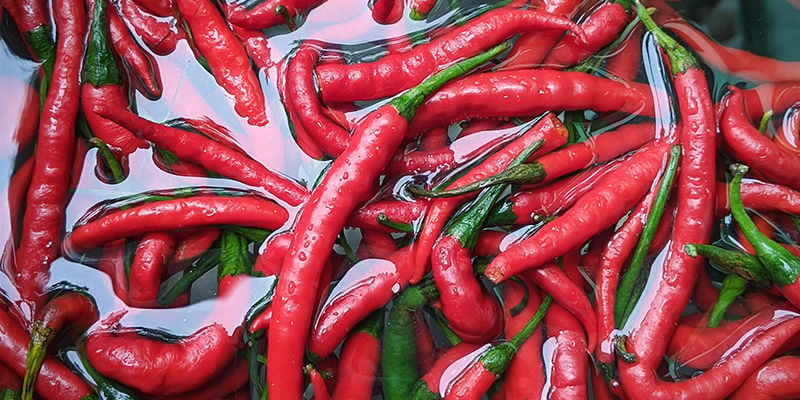
Once you've selected the perfect chilies for drying, it's essential to wash them thoroughly. If the chilies are from your own garden and haven't been sprayed with pesticides, herbicides, or other chemicals, rinsing them well in cold water to remove any dirt or dust should be enough. Remember to rub them under running water to ensure they get a proper clean.
If you're using store-bought vegetables, on the other hand, it's a good idea to wash them under warm water. Warm water helps remove extra dirt and residual pesticides/herbicides found on the peel of store-bought fruit and vegetables, as well as waxes sometimes used to make groceries appear fresher than they are!
How to dry chilies the traditional way
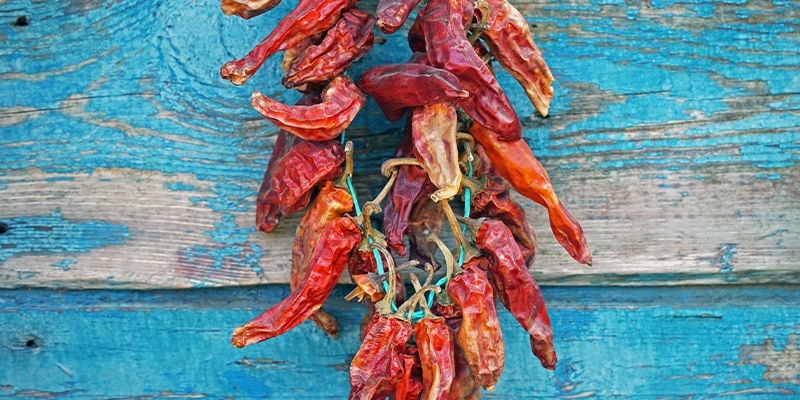
One of the simplest ways and most traditional methods for drying chilies is by hanging and air-drying them (either indoors or outside). To do this, use a long piece of string and tie it around the individual stems of your chilies, leaving at least 5cm between each berry. To ensure your chilies dry evenly, you need to make sure to leave enough space between them so moisture doesn't get trapped in areas where they touch.
Air-drying chilies works best in warm, dry climates with average day temperatures of at least 20˚C. If you live in a more tropical climate with warm temperatures and high humidity, you might want to consider drying your chilies in an oven or dehydrator. The moisture in the air may slow down the drying process and even cause your chilies to rot rather than dry. When choosing to air-dry chilies or peppers, it's also a good idea to opt for varieties that have naturally thinner flesh, such as Aji Rojo, Cayenne, and Thai chilies.
One of the reasons people opt for air-drying their chilies by hanging them is because it is a slower process that can help preserve more flavour. Also, taking the time to dry your chilies this way can also be a great exercise to develop patience in the fast-paced world we live in.
How to dry chilies in the oven

If you're pressed for time or live in an environment that's too cold or humid to air-dry chilies, don't fret. You can use any conventional oven to dry chilies and still achieve great results. However, it is worth noting that this process is far more hands-on than hanging them.
To do this, you'll want to place your washed and dried chilies onto a lined baking sheet and bake them at roughly 50˚C for several hours. If you're drying big, thick-walled berries (such as bell peppers, for example), cut them in half to ensure they dry evenly. On the other hand, small, thin-walled chilies should dry well even if left whole. Just make sure the chilies aren't touching on the sheet, and keep the oven door slightly open to allow moisture to escape as they bake.
The exact time it takes to dry chilies in the oven will vary greatly depending on the size, and strain of your chilies and peppers. It's best to reserve several hours for this process, checking in on your chilies every 30 minutes and flipping them every hour. There's a good chance that some chilies will dry before others, so make sure to remove the dry ones to keep them from getting overly dried, which would result in a loss in flavour. You'll know a berry is dry when it's got a hard, crinkly texture.
How to dry chilies in a food dehydrator
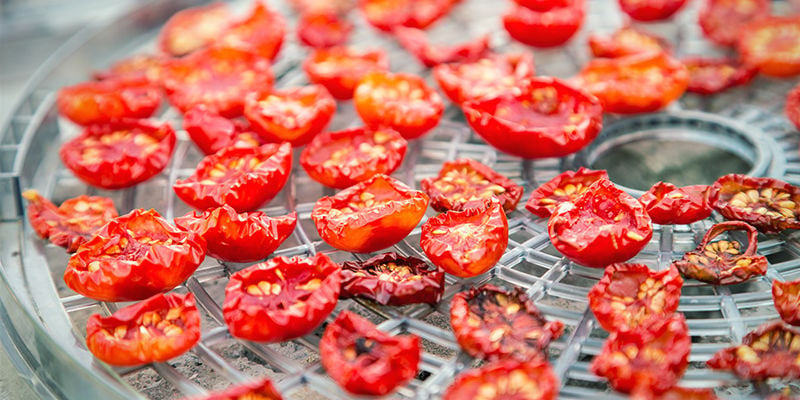
Arguably the fastest and most convenient way to dry chilies and peppers at home is using a food dehydrator. Simply load your berries into the appliance as per the instruction manual, and remember to cut bigger chilies in half or even smaller chunks to speed up the process and get more consistent results. Like when drying in an oven, make sure you spread your chilies out evenly across the dehydrator's tray to allow moisture to escape them properly.
The exact time it takes to dry chilies in a dehydrator will vary depending on the functioning of your particular dehydrator as well as the chilies you're using. Make sure to check the user guide or with the manufacturer for more information.
What to do when your chilies are dried
Dried chilies can be stored whole and rehydrated in oil or water when you need them—just like dried tomatoes you find at health food stores or supermarkets. Alternatively, if you've dried particularly aromatic or hot chilies, you can process them into a ground spice using a coffee grinder, spice mill, or food processor. Just remember to do so in a well-ventilated space and use a face mask and goggles to avoid inhaling the spicy powder or irritating your eyes. You can also use a coarser grind to make your very own chili flakes.
How to store your dried chilies
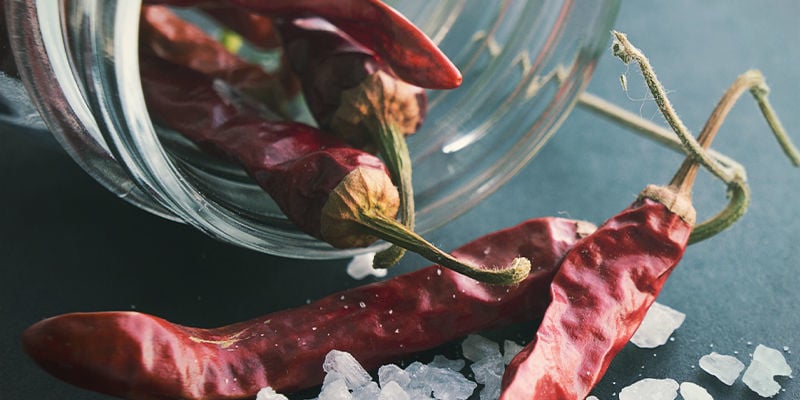
Dried whole chilies are best stored in a mason jar, regular glass jars, ziplock plastic bag, or any other airtight container. This will help preserve the natural flavours and aromas of the chilies for as long as possible, while keeping air moisture out. Ground chilies and chili flakes are also best stored in a sealed container and in a cool, dry place to preserve the aromas and flavours of the spice for as long as possible. Also keep both your ground and whole chilies out of direct light to preserve their flavours and heat.
While properly dried and stored chilies can last indefinitely, it's best to consume them within 3 months to enjoy the maximum flavours and aromas. Even with proper storage, dried chilies will begin to lose their flavour over time. In general, chili flakes tend to lose their flavour and aroma a little faster, so consider leaving your chilies whole to help preserve them.
Perfectly dried chilies, every time
Drying chilies is a great way to preserve their flavour and extend their shelf-life. The techniques we explored in this article also work particularly well if you grow your own chilies/peppers at home and want to preserve the fruits of your hard work in the vegetable garden!
-
 4 min
16 May 2022
How To Store Chilies And Peppers (Short And Long Term)
There's no doubt about it; cultivating pepper and chili plants is a hugely rewarding experience. But it's the harvest we really do it for. Having a supply of great-tasting and spicy chilies at your...
4 min
16 May 2022
How To Store Chilies And Peppers (Short And Long Term)
There's no doubt about it; cultivating pepper and chili plants is a hugely rewarding experience. But it's the harvest we really do it for. Having a supply of great-tasting and spicy chilies at your...
-
 3 min
29 April 2022
How To Pickle Hot Peppers
Discover how to preserve chili peppers with pickling here. With step-by-step instructions and some top tips, we've everything you need to start your chili pickling journey!
3 min
29 April 2022
How To Pickle Hot Peppers
Discover how to preserve chili peppers with pickling here. With step-by-step instructions and some top tips, we've everything you need to start your chili pickling journey!
-
 3 min
22 April 2022
Can You Freeze Chilli Peppers?
Here we look into freezing as a method of storage for fresh chilli peppers. After you've secured your bumper harvest, look to your freezer as a means of keeping your chillies fresh for months to come!
3 min
22 April 2022
Can You Freeze Chilli Peppers?
Here we look into freezing as a method of storage for fresh chilli peppers. After you've secured your bumper harvest, look to your freezer as a means of keeping your chillies fresh for months to come!
-
 4 min
18 February 2022
Tips For Growing Hotter Chili Pepper Plants
Surely it's down to chance just how hot your chili peppers can be, right? Well, while various factors determine spice level, there are actually several things you can do to really get the hottest...
4 min
18 February 2022
Tips For Growing Hotter Chili Pepper Plants
Surely it's down to chance just how hot your chili peppers can be, right? Well, while various factors determine spice level, there are actually several things you can do to really get the hottest...














 United States
United States










